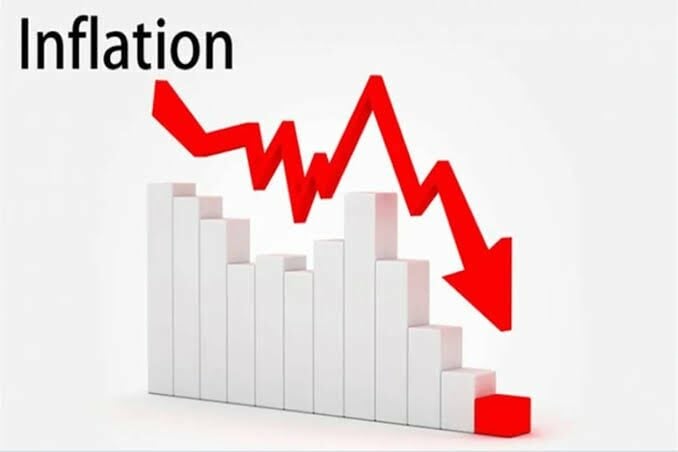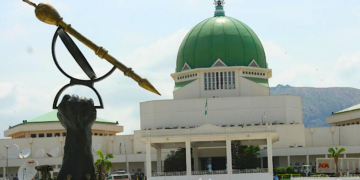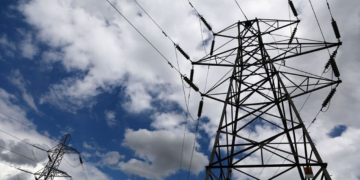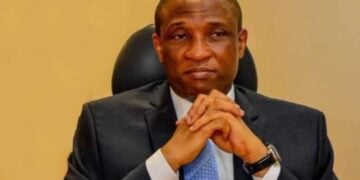The National Bureau of Statistics (NBS) has announced that Nigeria’s headline inflation rate eased to 18.02 per cent in September 2025, compared to 20.12 per cent recorded in August, representing a decline of 2.1 percentage points.
According to the NBS’s latest Consumer Price Index (CPI) report, released on Wednesday, the new data reflects the outcome of a recent CPI rebasing exercise. The exercise now uses 2024 as the new base year and 2023 as the weight reference period.
The statistics agency explained that the moderation in inflation was influenced by slower price increases across key consumer divisions, particularly food and non-alcoholic beverages, restaurants and accommodation services, and transport, the three major contributors to the headline index.
Economic experts attributed the decline in the inflation rate to a combination of factors, including improved agricultural output, exchange rate stability, and macroeconomic policy improvements.
At the divisional level, food and non-alcoholic beverages contributed 7.21 per cent, restaurants and accommodation Services 2.33 per cent, and transport 1.92 per cent to the overall inflation rate.
The least contributors were recreation, sport, and culture (0.06 per cent), alcoholic beverages, tobacco, and narcotics (0.07 per cent), and Insurance and financial services (0.08 per cent).
On a month-on-month basis, the headline inflation rate stood at 0.72 percent in September, slightly below the 0.74 percent recorded in August, indicating a 0.02 percentage point moderation.
The NBS report showed that food inflation slowed to 16.87 per cent year-on-year in September. Month over month, food inflation declined by 1.57 per cent, representing a 3.22 percentage point drop from 1.65 per cent recorded in August.
The bureau attributed this decline to falling average prices of staple food items, including maize, garri, beans, millet, potatoes, onions, eggs, tomatoes, and fresh pepper.
The core inflation rate, which excludes prices of volatile agricultural commodities and energy, stood at 19.53 percent year-on-year in September 2025. On a month-on-month basis, it was 1.42 per cent, down slightly from 1.43 per cent in August.
Analysis of sub-indices showed that Services rose by 1.17 per cent, while Goods increased by 0.44 per cent, with corresponding indices of 129.7 and 126.4, respectively. In contrast, farm produce and energy recorded declines of -0.75 percent and -0.47 percent.
Urban inflation stood at 17.50 per cent year-on-year, while the month-on-month rate was 0.74 per cent, up by 0.25 percentage points from 0.49 per cent in August.
In contrast, rural inflation was 18.26 per cent on a year-on-year basis. The month-on-month rate for rural areas fell to 0.67 per cent, lower by 0.71 percentage points from 1.38 per cent in August.
Commenting on the development, the director/chief executive officer of Centre for the Promotion of Private Enterprise (CPPE), Dr Muda Yusuf, attributed the decline to a combination of factors, including improved agricultural output, exchange rate stability, and macroeconomic policy improvements.
He, however, remarked that inflation remains high and urged the government to implement targeted policy actions to consolidate the gains and achieve sustainable economic growth.
“The sustained disinflation trend is a welcome development and a sign of improving macroeconomic fundamentals. However, the cost-of-living crisis remains acute, particularly for low- and middle-income households.
“The next phase of reform must therefore prioritize welfare-focused and cost-reduction measures that deliver tangible relief to citizens.
“Business confidence is rising, but consumer confidence remains fragile. Policies that enhance productivity, stabilize prices, and reduce the structural cost of doing business will not only strengthen the disinflation trajectory but also foster inclusive and sustainable economic recovery,” he said.
Yusuf stated that to consolidate the current gains and sustain the disinflation momentum, there must be enhanced food security and agricultural productivity; reduced logistics, transport, energy and production costs; increased access to affordable finance; reformed port and trade logistics, and sustained macroeconomic stability.
The CPPE CEO added that, with consistency, coordination, and structural reforms, Nigeria can achieve a stable single-digit inflation rate over the medium term, anchored on growth, improved welfare, and restored confidence in the economy.
On his part, the chief executive of AntHill Concepts Limited, and member of the Board of Economists, NATIONAL ECONOMY, Dr. Emeka Okengwu, said the rate of inflation does not necessarily change the quality of life of ordinary Nigerians in this instance.
“The rate of reduction in inflation must be juxtaposed with the growth of infrastructure, population and food productivity.
“You can have inflation rate dropping while poverty rate is going up. What we need to do is to improve on our productivity and have a GDP that is measurable against disposable income of Nigerians, growth that impacts on food prices and services. The moment we get that then we are good to go,” he stated.
Meanwhile, the statistics bureau cautioned that inflation comparisons across states should be interpreted carefully, as consumption patterns and expenditure weights differ significantly between states and locations.
The report revealed wide variations across states. On a year-on-year basis, headline inflation was highest in Adamawa (23.69 per cent), Katsina (23.53 per cent), and Nasarawa (22.29 per cent). The slowest increases were recorded in Anambra (9.28 per cent), Niger (11.79 per cent), and Bauchi (12.36 per cent).
On a month-on-month basis, inflation was highest in Zamfara (9.36 per cent), Adamawa (8.15 per cent), and Nasarawa (7.49 per cent), while Niger (-8.14 per cent), Oyo (-5.56 per cent), and Bayelsa (-4.61 per cent) recorded declines.
For food inflation, Ekiti (28.68 per cent), Rivers (24.18 per cent), and Nasarawa (22.74 per cent) posted the highest year-on-year increases. The slowest rises were observed in Bauchi (2.81 per cent), Niger (8.38 per cent), and Anambra (8.41 per cent).
On a month-on-month basis, food inflation climbed the most in Zamfara (15.62 per cent), Ekiti (12.77 per cent), and Sokoto (12.55 per cent), while sharp declines were recorded in Akwa Ibom (-12.97 per cent), Borno (-12.95 per cent), and Cross River (-10.36 per cent).





